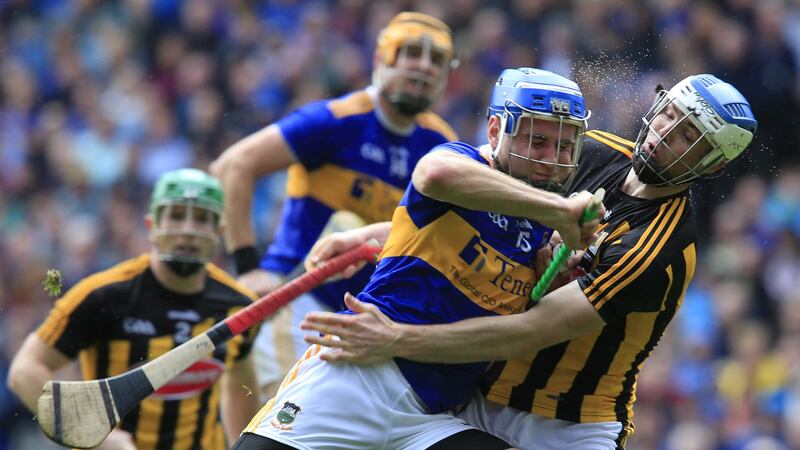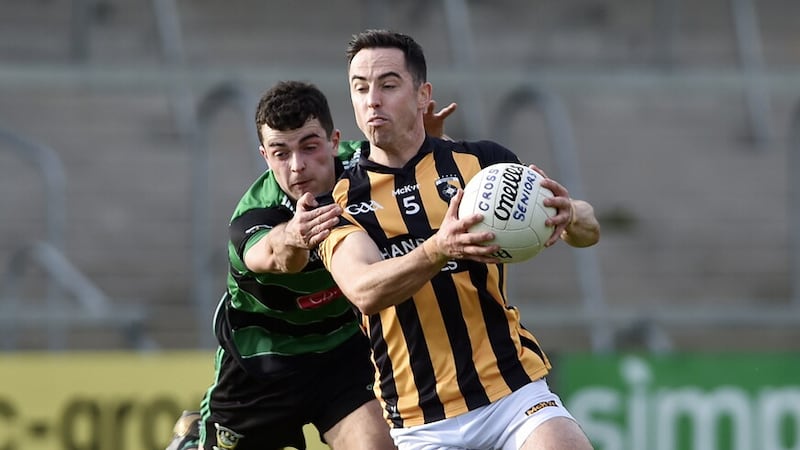WHEN the final curtain came down at the end of the 2018 season, hurling felt blissfully in the midst of another ‘Golden Age’.
Galway’s breakthrough in 2017 was followed by Limerick’s glorious victory last season.
After Clare’s memorable success in 2013, this hurling era was certainly glistening with gold.
Any time the term ‘Golden Age’ is mentioned, that period inevitably involves different, more novel counties.
Despite Cork, Kilkenny and Tipperary winning seven All-Ireland between 1950-’60, that period is still heralded as hurling’s first ‘Golden Age’, primarily because of the emergence of Wexford as a serious force.
Waterford’s annexing of the 1959 All-Ireland cemented that period as one of glorious breakthroughs.
The next ‘Golden Age’ didn’t arrive until the 1990s, when Offaly, Clare and Wexford won five All-Irelands between 1994-98.
Hurling thrives on such years and eras, especially in a sport that has been dominated by three counties winning 72 per cent of the championships.
There is always an element of excitement and electricity when the ‘Big Three’ are no longer dominating.
Last year’s Galway-Limerick All-Ireland final was even more novel considering it was the first time in 22 years that none of the Big Three had contested an All-Ireland for two years running.
That statistic was even more revealing given that Cork, Kilkenny and Tipperary have been absent from two consecutive All-Ireland finals on just three other occasions in GAA history.
Nine teams started out the 2019 summer with realistic ambitions of winning Liam MacCarthy.
The last time the championship pack was so strong was back in 1999, when nine teams would have set out believing they could win an All-Ireland.
The big difference back then though, was that the championship was still a knockout system and most of the contenders had fallen by mid-June.
Under the new system, the game is possibly in the greatest place it’s ever been. But, for the magic to keep happening, the empires still have to be in a position to emphatically strike back. And, in 2019, they certainly did.
The old-firm of Tipperary-Kilkenny was back.
Kilkenny may have dominated the modern era but Tipperary finished the decade as they had started it – as All-Ireland champions.
The quality in 2019 was nowhere near as high as the spellbinding brilliance of 2018 but there was still enough drama to make it another enthralling hurling summer. And there were almost as many compelling sub-plots.
The Saturday night knife-edged drama in mid-June turned one of the longest days of the year into some of the longest and agonising seconds in GAA history.
The end of the Dublin-Galway and Wexford-Kilkenny games created the most chaotic fusion of suspense, excitement, joy, anxiety, fear and devastation ever experienced amongst players, management and supporters inside three minutes.
Galway, favourites for the All-Ireland at the start of the summer, went out on scoring difference. Less than 24 hours later, Clare beat Cork but they also departed the championship on scoring difference, the damage having been done after heavy defeats to Tipperary and Limerick.
It was the first time that happened in GAA history but the hurling championship is so tightly balanced now that it was always bound to happen sooner rather than later. On that night in mid-June, the four teams – Galway, Kilkenny, Dublin and Wexford – could have all either qualified or been eliminated.
Nobody wanted to envisage that nightmare scenario of teams exiting on scoring difference until it actually happened. Yet such an unforgiving system saw the 2018 All-Ireland finalists, and the Clare team they narrowly beat in an All-Ireland semi-final replay, dumped out of the championship after the Round Robin system. Waterford, All-Ireland finalists two years ago, departed the championship after failing to win a single game.
They weren’t the only teams to be razed in the championship’s white heat. Carlow manned up but didn’t have enough man-power to survive the inevitable scorching. After beating Galway, Dublin thought they had their foot close to the summit, but Laois pushed them off the cliff edge.
The Rebels looked dangerous when taking the backroads into the main battlefield but a hail of Patrick Horgan bullets wasn’t enough to shoot down Kilkenny.
Limerick looked imperious in the Munster final but the deathly trend of the Munster champions falling at the All-Ireland semi-final was maintained. Kilkenny hunted them down and Limerick fell to the floor.
Wexford were glorious and victorious on Leinster final day. That glory looked set to be extended when Lee Chin rattled the Tipperary net midway through the second half but Wexford seemed more spooked than inspired by a five-point lead with an extra man, and Tipp sprinted past them.
The old-firm was new again but the hurling summer was one long constant stream of talking points; Greg Kennedy’s presence on the field as Dublin’s maor foirne stirred the hornet’s nest in Nowlan Park; Laois lighting up the championship; Shane Dowling’s wonder strike for Limerick against Kilkenny; Cork ending a decade without an All-Ireland for the first time; Seamus Callanan’s lust for green flags; Mark Fanning’s golden penalty in the Leinster final; Limerick’s missing ’65 in the All-Ireland semi-final; TJ Reid’s ascension into the pantheon; Brian Cody’s enduring greatness; the empires striking back.
Winning another All-Ireland with this Kilkenny team would have been Cody’s greatest achievement but getting them to the final further underlined Cody’s genius.
Tipperary’s firepower has always set this group apart but the tone of Tipp’s second-half performance in the final – even with an extra man - carried huge echoes of how Kilkenny used to routinely strangle the opposition; annihilate them in the air and make the other crowd feel like they’re hitting the ball against a brick wall; Kilkenny were never destroyed on their own puckout like they were in the second half. Tipperary were deserving All-Ireland champions.
The old may have become new again but, even in the midst of another ‘Golden Age’, the old-firm of Kilkenny-Tipperary playing out a fifth All-Ireland final in 10 years still seemed a fair way to bring such a glorious decade to a close.







